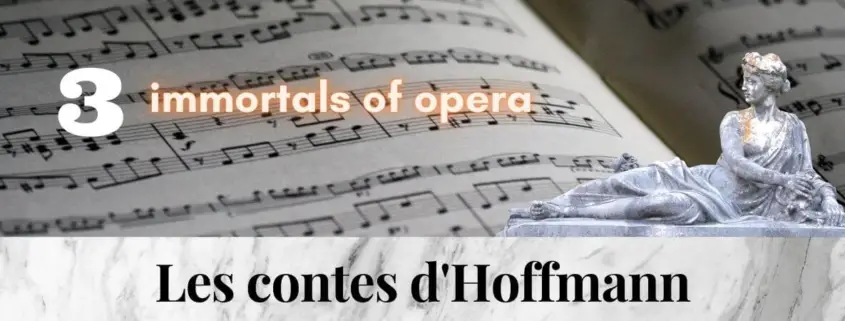The fantastic tales of E.T.A. Hoffmann inspired Jacques Offenbach to create a work that is one of the greatest French operas. It is inconceivable what creative energies Offenbach was able to unleash in the face of his death. In addition to three world-famous catchy tunes, he created scenes that are unique in their variety, each individually crafted with humor and mastery.
The Ballad of Kleinzack
Part of the charm of this aria comes from the German wordiness of the hard consonants like “cric crac” and “Kleinzack” and the awkward, dotted accompaniment of the orchestra. The ballad is divided into two parts, in the first major part Hoffmann sings about the whimsical dwarf Kleinzack and in the second minor part his thoughts wander off to Stella, the piece is subtitled Rêverie for this reason.
Listen to them a fantastic interpretation by Placido Domingo. His voice on Bonynge’s recording sounds incredibly fresh and juicy.
Il était une fois à la cour d’Eisenach – Domingo/Bonynge.
Olympia – a unique role
“Les oiseaux dans la charmille” is one of the most unique pieces of opera literature. The singing machine Olympia is on stage for half an hour and for a long time she only says “oui”. Finally, the Olympia awakens and begins to sing. It is, of course, a caricature of the singers Grand Opéra, the coloratura singer only has to be wound up and she produces sounds like an automaton.
The aria is virtuosic with many coloraturas and at the same time the singer has to imitate with her voice the choppy singing and the mechanical dancing movement of a puppet, just as the composer had ingeniously set it to tones. This is a great challenge for the singer in live performance.
Listen to Joan Sutherland, whose nightingale throat earned her the honorary title of “La Stupenda.”
Les oiseaux dans la charmille – Sutherland.
The Barcarolle – a stroke of genius by Offenbach
Offenbach recycled this famous duet with choral accompaniment from the opera “Rheinnixen”.
Barcarolle (belle nuit, o nuit d’amour); Caballé/Verrett







Leave a Reply
Want to join the discussion?Feel free to contribute!